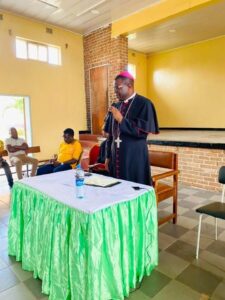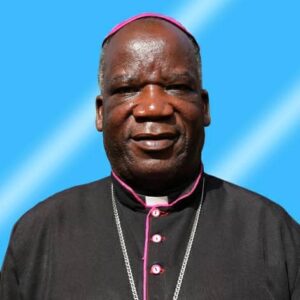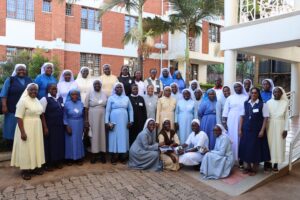UGANDA: ARU Spearheads Formation, Capacity Building of Religious in Uganda
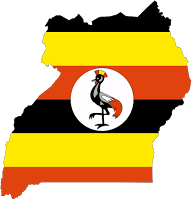
As the Association of Religious in Uganda, (ARU) marked its Golden Jubilee, formation and capacity building of its members stand out as hallmarks of the Association’s key activities.
“Formation and capacity building are the key programmes which keep our members continually attracted to the activities of the ARU,” Sr. Margaret Kubanze, the Secretary General of the Association explained.
ARU is a Conference of Major Religious superiors of men and women in Uganda. Founded in 1968, the Conference has a membership of one hundred (100) Congregations with a total of 6,000 Religions men and women serving in the country.
Spirituality programmes
Under formation Sr. Margaret Kubanze said they have an annual programme for novices and that Institutes with second year novices often apply to participate in. “The joint formation programme is well coordinated, and often between 150 and 190 novices participate in this annual programme,” the Secretary General said.
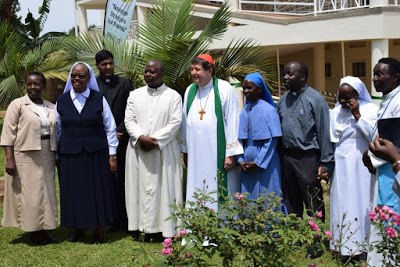
(in the Centre) and the Vatican Chargé d’affaires (far left) Msgr. Alfred D’Sousa
Besides the joint course for novices, she said junior Religious who are preparing for their perpetual vows also have a joint one month programme they participate in annually. And, there are several other formation programmes ranging from one week to one year, organised for different groups of Religious men and women throughout the course of the year.
“We also have plans to offer courses on charism, patrimony and on Consecrated life in general,” she said.
Most importantly, Sr. Kubanze said, other renewal courses that take slightly longer take place at the Uganda Spiritual Formation Centre in Namugongo. One of the key courses offered at the Spiritual Formation Centre is the formation of formators.
“There is also an upcoming programme in which we will train retreat directors and councillors,” Sr. Kubanze further added.
Capacity building of members
In the area of capacity building, ARU organises short courses in computer skills that run for two weeks or so, and will soon have training in advocacy to give them skills to boost their apostolate.
ARU also has a programme on agriculture that helps Congregations to develop their potential in agricultural production. A series of other capacity building programmes that run under African Sisters Education Collaborative (ASEC) has a total 270 beneficiaries who have graduated in short to long courses, ranging from computer skills to Masters programmes in various professional fields. The courses offered under Sisters Leadership Development Initiative, (SLDI) include skills in management, administration and finance, fundraising and project management,among others.
Currently there are 140 ASEC beneficiaries studying in universities and other tertiary institutions in Uganda offering a range of professional courses like education, nursing and business administration. This programme operates under ASEC’s Higher Education for Sisters in Africa, (HESA).
Detailed write up on ASEC programme and stories of beneficiaries will be in the next issue.
Child protection issues
Another key capacity building programme that ARU is spearheading, according to Sr. Kubanze, is coordinated under Catholic Care for Children in Uganda, (CCCU). Sister Helen Jola, a member of the administrative staff at ARU Secretariat explained that CCCU has for the last two years been building the capacity of the Religious who work in care homes for children and babies. She said it was after the realisation that many Religious run these homes unprofessionally.
“Many sisters are just assigned to these homes without knowing how to handle these children professionally,” she observed. She said ARU was therefore building their capacity so that they know issues like child protection policies not only for the children in those homes but also be able to disseminate these skills to the people at the grassroots. “Many people including the religious don’t know what it means to protect the rights of a child and what is tantamount to child abuse,” said.
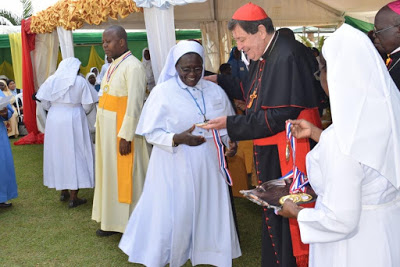
Receives a medal From Cardinal De Avis as a sign of distinguished
service to ARU
ARU is also training the Religious in social work and development because most of these homes lacked social workers. She said working in these homes in the past only took care of the basic and physical needs of the children like food, clothing and education while the social needs of these children were not being taken care of. ARU is therefore building their capacity so that they are able to provide an all-round care for the children in the homes.
Most importantly, Sr. Jola explained that there was also a thrust to work collaboratively with the line Ministries such as the Ministry of Gender, Labour and Social Development in Uganda. “We are linking with the Ministry to help us understand how we can provide the best services to the children in our homes and already we have some key staff from the Ministry who facilitate our workshops for the Religious,” she observed.
But on the whole, ARU Assistant Secretary General, Sr. Specioza Kabahuma, said there was a lot of awareness-raising on the legal frameworks related to Child protection. She noted that ARU in collaboration with the Uganda Episcopal Conference (UEC) had come up with Child Protection policy which has been given to all Religious institutes in Uganda. Additionally, the team members of CCCU staff at the Secretariat are moving to various Congregations, sensitising members on what abuse is.
There are also other ongoing initiatives at aimed making Religious aware of Uganda’s legal framework regarding protection of children. Recently the Association, in partnership with Union of International Superiors General, (UISG) from the Vatican, organised a conference on sexual abuse. She said the seven-day workshop attracted more than 70 participants from among Religious men and women, diocesan priests and other people who work or have contact with children in the homes that the Religious run.
In a similar programme that involved Makerere University, ARU administration also collaborated with the bishops such that every diocese at least had a representative at a one-week workshop on Child Protection. The priests that attended the workshop were either directors of Pontifical Missionary Societies, (PMS) or chaplains in schools.
Sr. Kabahuma noted that the bishops in Uganda had moved a step further. She said while the religious had made child protection policy focussing on children’s homes, the bishops have made a general Child Protection Policy whose first draft is already out. The idea is to circulate these to Church institutions like schools and children’s homes, and ARU was involved in the development of this draft Child Protection Policy.
Beyond giving skills and academic knowledge, that programme is also helping the Religious to strengthen their charism. As they report for the beginning of the semester, there is a period where they are taught about their charism so that when they are working, they work from an informed position. She noted that deepening the participants’ knowledge and understanding of their own charisms may serve as a deterrent measure towards the prevention of child abuse.
General formation syllabus for religious
ARU has also has created a new desk for the Formation Ministry of the Religious in Uganda, (FoMRU). This was done through overhauling the whole process of formation at ARU. Sr. Kubanze observed that until recently, each Religious institute had its own formation syllabus for the formation of its members.
Two years ago ARU through its Executive and the Formation Committee realised that it was high time they came up with a common syllabus for the formation of the Religious in Uganda. Hence, the Committee set about working on a general formation syllabus which is to be rolled out to all Religious institutes in the country.
The Secretary General who is a member of the Little Sisters of St. Francis said FoMRU was therefore trying to streamline formation so as to come up with a general formation syllabus. She explained that the syllabus would cover general aspects of religious formation while individual Congregations would be expected to slot in what is specific to them.
According to her, this would serve as a general guideline so that the various Religious institutes include what is specific to their institute such as the charism, the spirituality of their founder/foundress, the Constitution, vision, and mission of their institute, among others.
Sr. Kabahuma further explained that the creation of FoMRU arose from the disparity that trainers experienced during the annual joint national course for novices. She said trainers noted that some of the novices were either ahead or lagged behind, while everything almost seemed new to others. Major superiors in Uganda therefore realised that there was need to harmonize so as to ensure that all Congregations are at the same pace when it comes to Religious formation in Uganda. Thus, the challenge propelled ARU to take up the development of a joint formation syllabus. “But it was also a good platform to bring religious together in solidarity,” Sr. Kabahuma said.
∽End∽
By Sr. Grace Candiru, MSMMC, ACWECA Communication Coordinator
